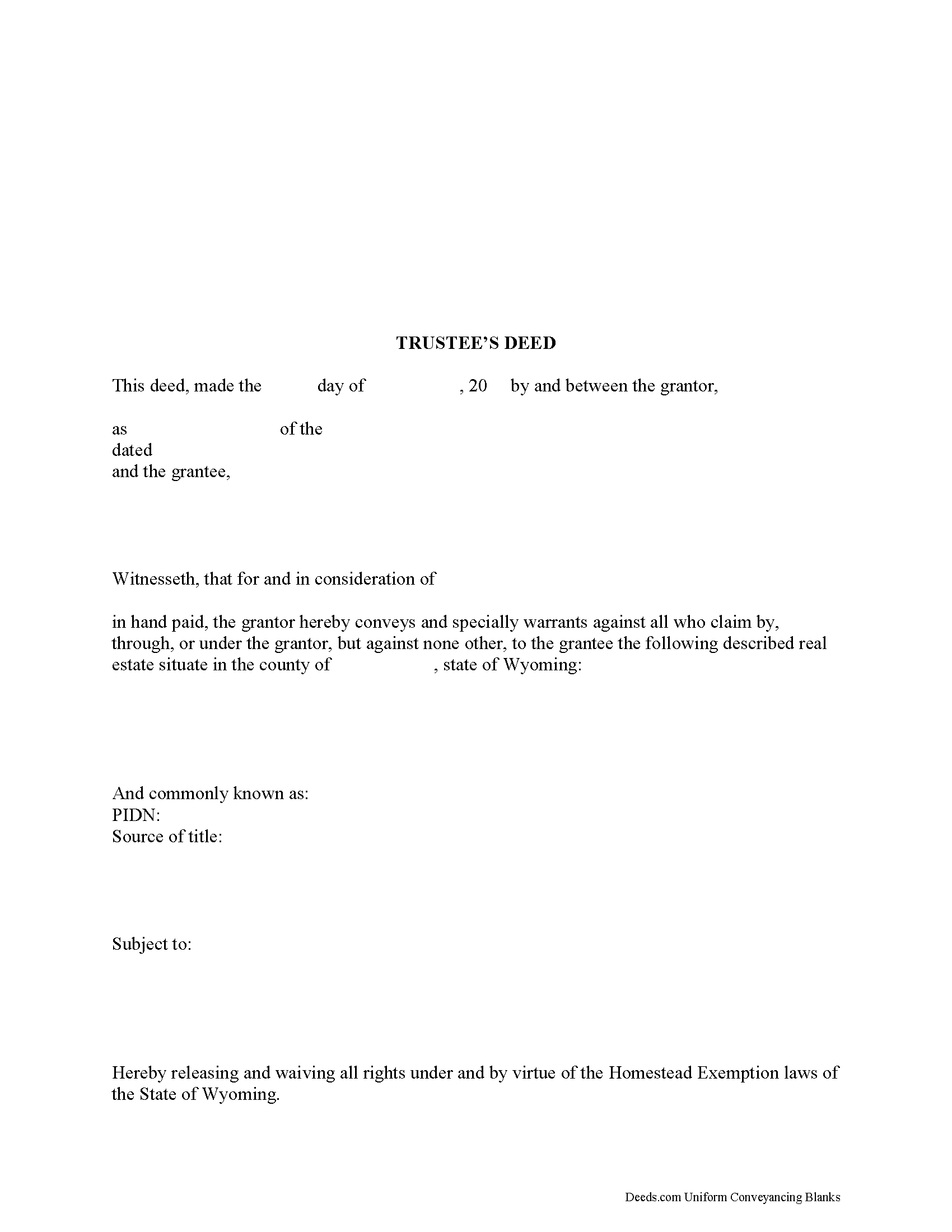Wyoming Trustee Deed
County Specific Legal Forms Validated as recently as January 21, 2026 by our Forms Development Team

About the Wyoming Trustee Deed

How to Use This Form
- Select your county from the list on the left
- Download the county-specific form
- Fill in the required information
- Have the document notarized if required
- Record with your county recorder's office
What Others Like You Are Saying
“KVH provided excellent customer service (great communication was provided). I would differently use …”
— Jason B.“i like this service! so convenient! 10 out of the 10”
— Kathrine v.“Love this site! So easy to use and very economical”
— BARBARA T.“After over a month of turmoil and feeling like "you can't get there from here",you solved …”
— Leslie S.“What a delight to find this Website. Professionally done and easy to work with.”
— Susan S.
A trust is an arrangement whereby one person (the settlor) transfers property to another (trustee), who manages it for the benefit of a third (the beneficiary). A settlor may establish a trust to take effect during his lifetime (inter vivos trust), or a trust may be created upon his death through probate pursuant to the provisions of a will (testamentary trust).
The settlor creates a living trust by executing a trust instrument, which generally remains unrecorded. The settlor may elect to serve as the original trustee and name a successor trustee, who will assume the powers and duties of the trustee upon the settlor's death or incapacity.
When real property is transferred into the trust, the property belongs to the trust. As the trust itself cannot hold title to the property, the settlor must execute a deed titling the property in the name of the trustee on behalf of the trust. The trustee is bound to serve the trust pursuant to its terms and the powers and duties of trustees, codified at Wyo. Stat. Ann 4-10-801 to 4-10-817 as part of the Uniform Trust Code in Wyoming.
To convey real property out of the living trust, the trustee must execute a deed as the granting party. A deed executed by a trustee in a representative capacity is simply titled a trustee's deed. In Wyoming, the trustee's deed is functionally equivalent to a special warranty deed. Though warranty deeds and quitclaim deeds are the most commonly used conveyancing forms in Wyoming, the special warranty deed was codified in 2015 at 34-2-136.
A special warranty deed is a conveyance in fee simple to the grantee and contains the covenants that the property is "free from all encumbrances made by the grantor" except those expressly noted in the form of conveyance, and that the grantor "will forever warrant and defend the title of the property in the grantee... against any lawful claim and demand of the grantor and any person claiming or to claim by, through, or under the grantor, but against none other" (34-2-137). Grantors serving in a representative capacity commonly use a special warranty deed for transfers because it limits their obligation to only the time they held title to the property.
The trustee's deed is modified from the statutory form of a special warranty deed to include the trust's vesting information in the granting field. It requires each acting trustee's name, the name of the trust, and the date of the trust instrument. To maintain a clear chain of title, the deed references the prior instrument by which the trustee acquired title. Trustees may present an affidavit or certification of trust to confirm their authority to convey trust property (see 4-10-1014). The deed is signed by each trustee in the presence of a notary public before recording in the county in which the subject property is located.
Consult a lawyer with any questions regarding trusts and trustee's deeds in the State of Wyoming.
(Wyoming TD Package includes form, guidelines, and completed example)
Important: County-Specific Forms
Our trustee deed forms are specifically formatted for each county in Wyoming.
After selecting your county, you'll receive forms that meet all local recording requirements, ensuring your documents will be accepted without delays or rejection fees.
How to Use This Form
- Select your county from the list above
- Download the county-specific form
- Fill in the required information
- Have the document notarized if required
- Record with your county recorder's office
What Others Like You Are Saying
“KVH provided excellent customer service (great communication was provided). I would differently use …”
— Jason B.“i like this service! so convenient! 10 out of the 10”
— Kathrine v.“Love this site! So easy to use and very economical”
— BARBARA T.“After over a month of turmoil and feeling like "you can't get there from here",you solved …”
— Leslie S.“What a delight to find this Website. Professionally done and easy to work with.”
— Susan S.Common Uses for Trustee Deed
- Transfer property between family members
- Add or remove names from property titles
- Transfer property into or out of trusts
- Correct errors in previously recorded deeds
- Gift property to others